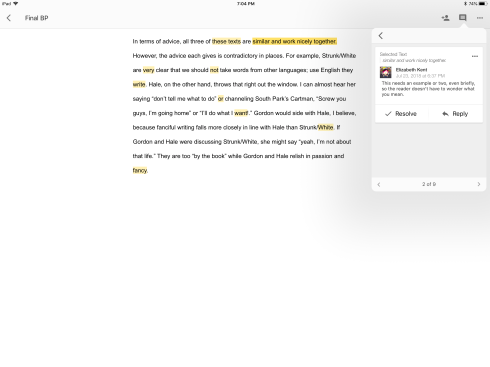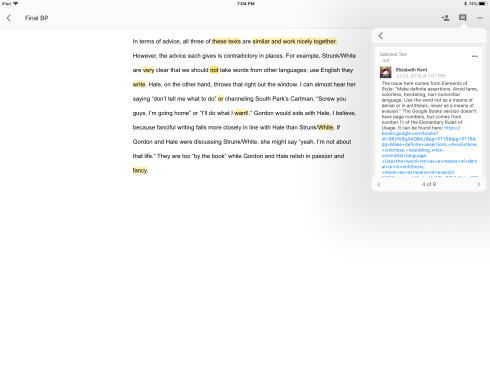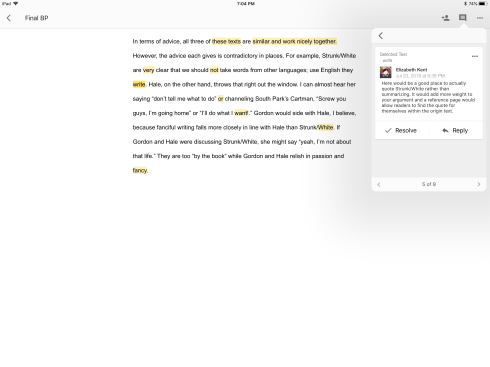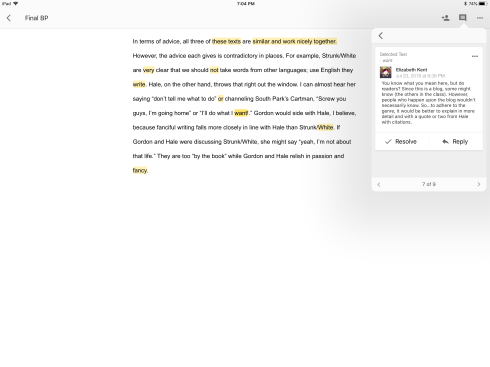Here is the paragraph I chose. The numbers correlate to the comments below:
In terms of advice, all three of these texts (1) are similar and work nicely together. (2) However, the advice each gives is contradictory in places. For example, Strunk/White are very (3) clear that we should not (4) take words from other languages; use English they write. (5) Hale, on the other hand, throws that right out the window. I can almost hear her saying “don’t tell me what to do” or (6) channeling South Park’s Cartman, “Screw you guys, I’m going home” or “I’ll do what I want!.” (7) Gordon would side with Hale, I believe, because fanciful writing falls more closely in line with Hale than Strunk/White. (8) If Gordon and Hale were discussing Strunk/White, she might say “yeah, I’m not about that life.” They are too “by the book” while Gordon and Hale relish in passion and fancy. (9)
 (1) Instead of “these texts” it would be more beneficial to readers to know what texts you are referring to since it’s the topic sentence of the paragraph.
(1) Instead of “these texts” it would be more beneficial to readers to know what texts you are referring to since it’s the topic sentence of the paragraph.

(2) This needs an example or two, even briefly, so the reader doesn’t have to wonder what you mean.

(3) This is an issue of style. In formal writing, the word “very” is called an intensifier…it doesn’t contribute to the meaning but intensifies the emotion of the modified word. Because this isn’t formal writing, the word can technically stay in the text, but if you are going for a more formal tone, consider removing it.

(4) The issue here comes from Elements of Style: “Make definite assertions. Avoid tame, colorless, hesitating, non-committal language. Use the word not as a means of denial or in antithesis, never as a means of evasion.” The Google Books version doesn’t have page numbers, but comes from number 11 of the Elementary Rules of Usage. It can be found here: https://books.google.com/books?id=5RyWBgAAQBAJ&pg=PT18&lpg=PT18&dq=Make+definite+assertions.+Avoid+tame,+colorless,+hesitating,+non-committal+language.+Use+the+word+not+as+a+means+of+denial+or+in+antithesis,+never+as+a+means+of+evasion.%22&source=bl&ots=VvWFm87kF_&sig=0CIrI13R_JbMUVg_1ZJbZ5Dh9sc&hl=en&sa=X&ved=2ahUKEwidrZP3trbcAhUMTd8KHdJXCUsQ6AEwA3oECAIQAQ#v=onepage&q&f=false

(5) Here would be a good place to actually quote Strunk/White rather than summarizing. It would add more weight to your argument and a reference page would allow readers to find the quote for themselves within the origin text.

(6) You should revise this sentence to properly form a list.

(7) You know what you mean here, but do readers? Since this is a blog, some might know (the others in the class). However, people who happen upon the blog wouldn’t necessarily know. So…to adhere to the genre, it would be better to explain in more detail and with a quote or two from Hale with citations.

(8) This implies that Gordon appreciates fanciful writing, but the previous comment applies here too. You are assuming too much of your reader’s subject knowledge. It would be better to be more specific with cited references so everyone can understand what you mean.

(9) This is a good closing sentence, but only if there is a sentence or two before it. You need to ensure that you are not rushing through your points. While it’s good to be concise, you don’t need to be so brief that you leave out pieces of the overall puzzle.
Prompt: In no more than 700 words, please connect your editing choices to something you read in the book about editing.
This isn’t going to be easy…but here goes:
Gerald Gross writes the following the preface for Editors on Editing: “The best editing is not the least or the most; it is whatever measure of editing evokes the writer’s greatest talent, that presents the writer’s work in the best possible light so that it garners great reviews, enhances the writer’s professional reputation and personal self-esteem, and reaches the audience the writer wrote for” (pp. xv). This advice left the single greatest impact on me. A lot of what I read in the text reinforces this idea, but nowhere is it as clearly and concisely stated. When I went back to find a paragraph I didn’t want to think about which one too long because I didn’t want to pick one that would be easy to fix. Instead, choosing one early on was a good idea because I had critical distance from it. It’s no easy task to set aside yourself and edit something you wrote. It’s something to consider when asking students to revise. However, I picked a paragraph and immediately went back to Gross’ text. I skimmed through my notes and picked out a few quotes to use while editing. Then and only then did I sit down to edit. Strunk/White crept in there too, which you can see in one of my comments. Most of what I did here was content editing; I chose to go this route of editing because it is what is most needed here. There are a few style edits and one glaring grammatical edit, but mostly I made suggestions to strengthen the message given the genre. Because this is a blog, audience is especially important. The comments I made reflect that. Had this paragraph appeared in a Blackboard discussion these edits would be less important; however, because this is public writing I can’t assume everyone reading is familiar with the texts. You’ll notice that my comments ask for more detail and cited references. These would pull the outside readers into our conversational loop in a way more productive all around.
Last week I read Linda Marrow’s chapter about romance novels; in it she discusses one of the keys to writing successful romance novels: genre conventions. This ties in with audience that I mentioned above and it forms the second major part of my editing this week. Marrow focuses on romance genres but her editing advice applies across the board. We don’t just have expectations when reading romances. Genres have conventions (yes, I know you can purposefully break them), and it is here that I pause for reflection. What are the genre conventions of a blog? Certainly that’s a loaded question because the answer is a dubious “it depends.” It depends on the type of blog being written. For me, the blog is part course requirement and part reflection. Because I have used it to reflect on my thinking and the readings I have forgotten that outside readers exist. The comments that I made for this paragraph address that potentially serious mistake. Should I resolve these comments by revising the text accordingly I would more fully address the variety of audiences that blogs can potentially have.
Works Cited:
Gross, Gerald, editor. Editors on Editing: What Writers Need to Know About What Editors Do, Grove Press, 1993.